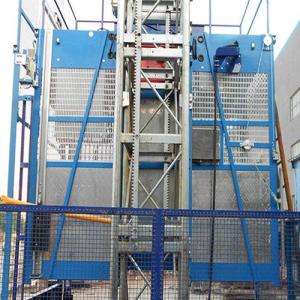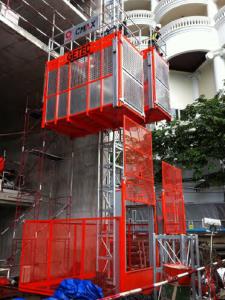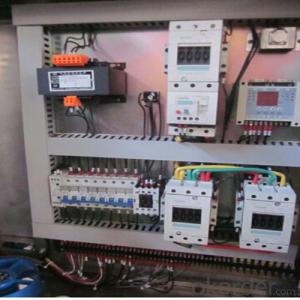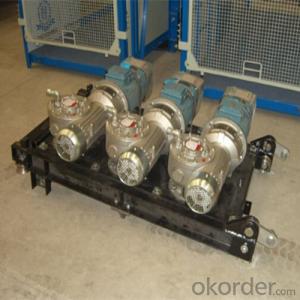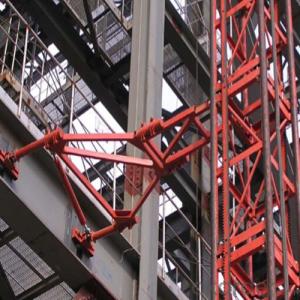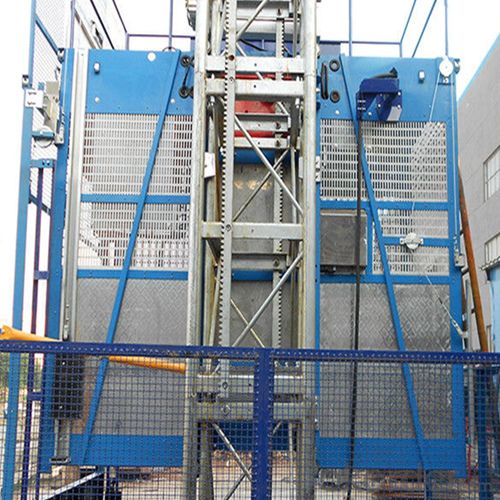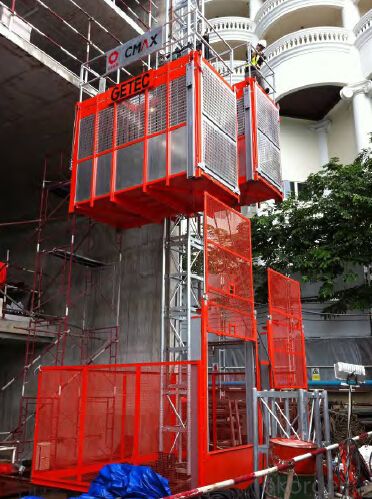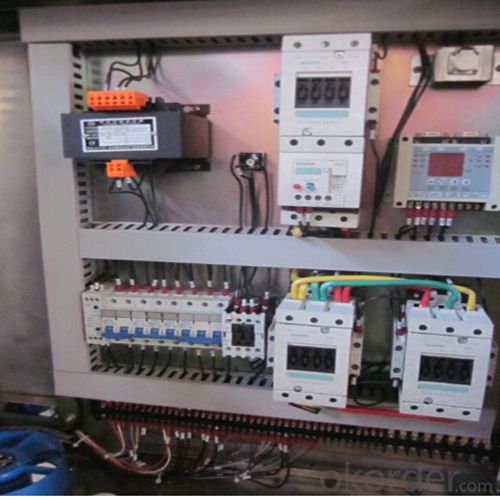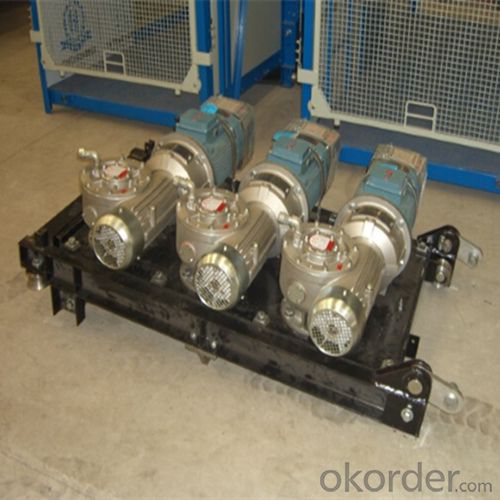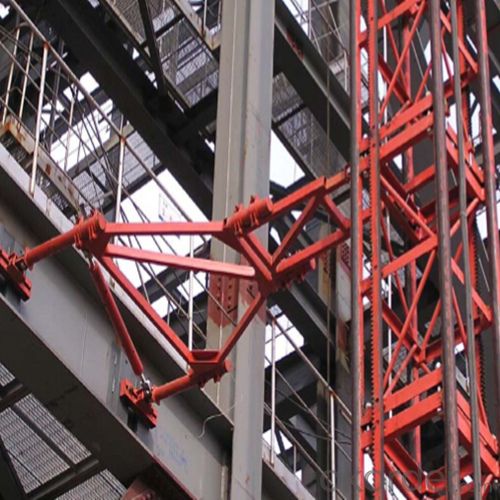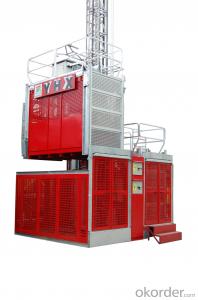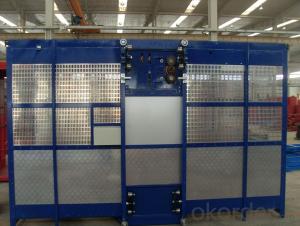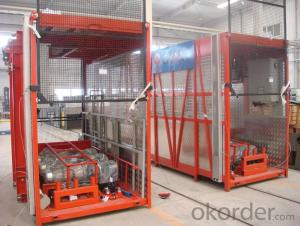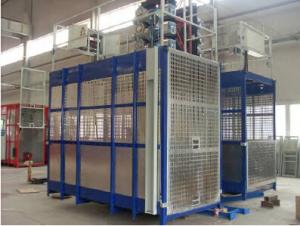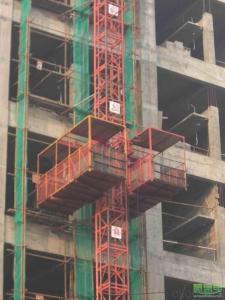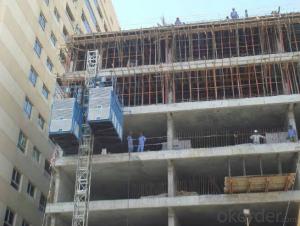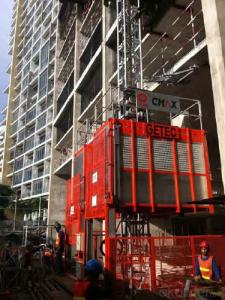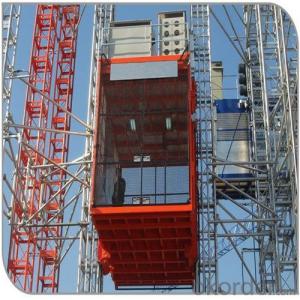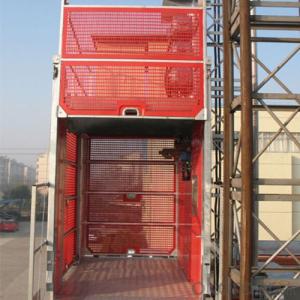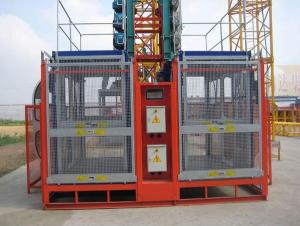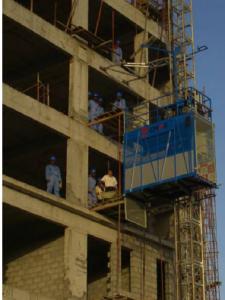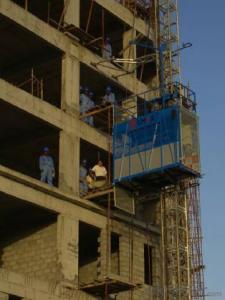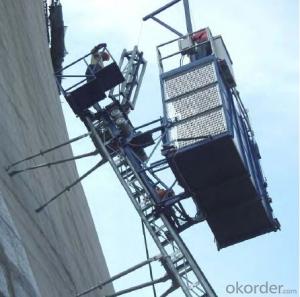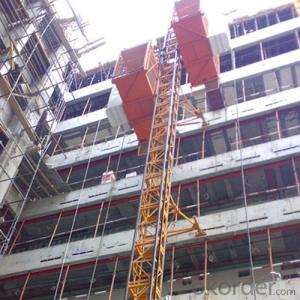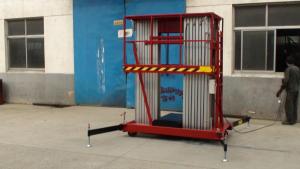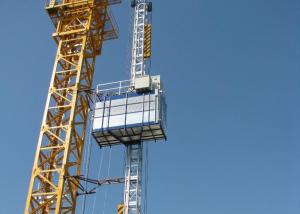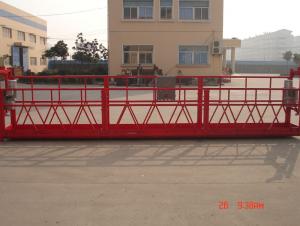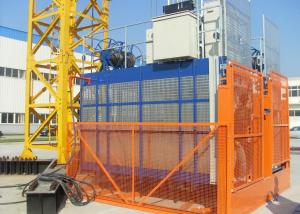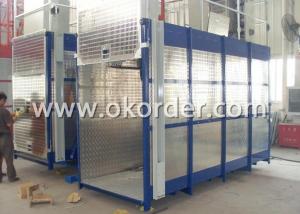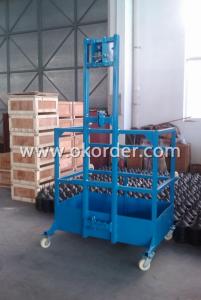Construction hoist SC150D,Steel Structure Uses Quality Steel from Famous Domestic Manufactures
- Loading Port:
- China main port
- Payment Terms:
- TT or LC
- Min Order Qty:
- 1 unit
- Supply Capability:
- 30 unit/month
OKorder Service Pledge
OKorder Financial Service
You Might Also Like
SC Hoist is a Rack and Pinion EL. Lift, used on construction site for transportation of personnel and materials. It is installed and dismounted conveniently and can grow as high as the buildings grow in height.
There are single cage and twin cage hoists. A single cage can be quickly transformed into twin cage hoist by adding a cage and other parts. The hoist payload can be increased by adding counterweight equipment.
SC Hoist has reliable electrical and mechanical safety device. It is a efficient and safety vertical transporting equipment.
Structure of Construction Hoist Description
Feature: Construction Hoist Condition: New Application: Construction
Payload(kg):2700 Lifting Speed(m/min):33 Motor Power(kw): 3*15
Safety Device: SAJ50-1.2 Cage: Single Counterweight: No
Certification: CE,ISO Place of Origin: China(Mainland) Model Number: SC150D
Construction Hoist Specifiction
Main technical data | Unit | Value |
Rated load | kg | 1500 |
Rated erection load | kg | 1000 |
Jib attachment rated load | kg | 300 |
Cage size | m | 3.0×1.3×2.5 |
Maximum lifting height | m | 250 |
Lifting speed | m/min | 0~45 |
Rated output | kW | 2×18.5 |
Voltage rating | V | 380/440 |
Rated frequency | Hz | 50/60 |
Rated current | A | 2×37.8 |
Power supply fuses | A | 96 |
Protective class | / | IP55 |
Load duration factor | / | FC-25% |
Safety device | m/s | 1.2 |
Enclosure weight | kg | 980 |
Cage weight | kg | 1850 |
Counterweight | kg | / |
Mast section weight | kg | 125/145 |
Mast section length | mm | 1508 |
Packaging & Delivery of Construction Hoist
Packaging Detail: Nude package Delivery Detail: 25-30days
Building hoist inmmages
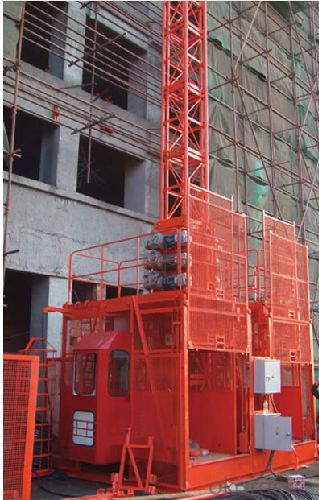
Main Parts of Construction Hoist
● The gearing adopts imported bearing, enameled cable, and oil seal.
● The electric parts adopt products from world renowned manufactures such as Schneider, Siemens, and LG.
● The racks and pinion adopts special material and heat-treatment technique, which prolong the life of these parts.
● The steel structure uses quality steel from famous domestic manufactures.
● The surface of the structure can apply paint-spray, parkerozing baking finish or hot galvanizing processing according
to users requirements,
● The cage can be produced and decorated by aluminum molded board, punched-plate or figured aluminm board.
FAQ of Construction Hoist
Q: What is the building hoist main purpose?
A: Building hoist equipped with double or single cabin to transport the materials and labors up and down. It's the ideal
construction equipment for vertical transportation in the field of construction.
Q: What is the main structure of building hoist?
A: The P/M construction hoist mainly contains metal structure, driving system, electrical control system, cable guide &
protection system, electrical top crane and safety device.
Q: What is the meaning of the building hoist’s code?
A: Take SC200/200 for example: “SC” stands for rack and pinion hoist, “200/200” stands for double cage and capacity
is 2 tons per cage. “SC200” stands for single cage and capacity is 2 tons.
Q: What is the dimension of the cage?
A: Normally the cage dimension is 3X1.5X2.5M (L/W/H) for 2t type hoist. Details should be checked according to our
quotation sheet. Also, the size can be customized according to the factual site condition. There are two doors (entrance
& exit doors) for each cage, It can be produced as up & down sliding or ramping model for safety and convenience.
- Q: Is it possible to use a building hoist for material transportation in both indoor and outdoor environments, especially in confined spaces within industrial zones?
- <p>Yes, building hoists can be used both indoors and outdoors in industrial areas, even with limited space. They are designed for material transportation during construction and are adaptable to various environments. For indoor use, hoists are often enclosed to protect from weather and debris. Outdoors, they may require additional weatherproofing. In confined spaces, compact and tower hoists are used to save space. However, safety regulations and space constraints must be considered to ensure proper installation and operation.</p>
- Q: This question asks whether building hoists can be utilized in limited areas like rooms or tunnels.
- <p>Yes, building hoists can be used in confined spaces such as rooms or tunnels, but it depends on the specific design and size of the hoist. Compact and portable hoists are available for use in tight spaces. However, safety considerations, space dimensions, and the weight capacity of the hoist must be taken into account. It's crucial to ensure that the hoist is suitable for the confined area and that all safety protocols are followed to prevent accidents.</p>
- Q: This question asks for an explanation of the working mechanism of a building hoist, which is a device used in construction to lift materials and workers.
- <p>A building hoist, also known as a construction hoist or personnel/material hoist, is a temporary lifting device used in construction projects to transport workers and materials vertically within a building. It typically consists of a tower, a cage, a drive mechanism, and a control system. The tower is attached to the building's structure, and the cage is where people or materials are loaded. The drive mechanism, often powered by an electric motor, raises and lowers the cage along the tower. The control system manages the movement, ensuring safety features like speed control and emergency stops are in place. The hoist operates within a guide rail system, which keeps it aligned as it moves up and down the building's height.</p>
- Q: This question asks for examples of typical uses for building hoists, which are devices used to lift materials in construction settings.
- <p>Building hoists are commonly used in various construction applications. They are utilized for lifting and lowering materials and personnel in high-rise construction projects. Some examples include: 1) Lifting building materials such as bricks, cement, and steel beams to different floors of a building under construction. 2) Transporting workers to elevated work areas for tasks like scaffolding assembly or window installation. 3) Moving heavy equipment to upper levels of a structure. 4) Assisting in the installation of large fixtures like HVAC systems or electrical wiring systems. 5) Facilitating the removal of construction waste from upper floors. These applications highlight the versatility and efficiency of building hoists in construction projects.</p>
- Q: Is it possible to use personal lifting equipment for lifting extremely heavy objects?
- <p>Using your own lifting equipment to lift very heavy objects can be possible, but it depends on the weight capacity and safety standards of your equipment. Always ensure that your lifting gear is rated for the weight you intend to lift and that it is in good working condition. Additionally, it's crucial to follow all safety protocols, including proper setup, securing the load, and using personal protective equipment. For extremely heavy objects, professional lifting services are often recommended to ensure safety and prevent accidents.</p>
- Q: Is it possible for a single lifting device to simultaneously lift multiple objects with varying weights?
- <p>Yes, a single lifting device can be used to lift multiple objects at once with different weights, provided the total weight does not exceed the device's lifting capacity. The device must be designed to handle the combined weight and ensure even distribution of the load. Safety measures and proper securing of the objects are crucial to prevent accidents. It's important to follow the manufacturer's guidelines and never exceed the maximum load capacity to avoid damage or injury.</p>
- Q: This question asks about the various types of control systems used in building hoists, which are essential for the safe and efficient operation of construction elevators.
- <p>There are several types of building hoist control systems that ensure the safe and efficient operation of construction elevators. These include: 1. Manual Control Systems: Operated by a human operator who controls the hoist's movement. 2. Semi-Automatic Control Systems: Combine manual operation with some automated features, like automatic level selection. 3. Fully Automatic Control Systems: Completely automated, with the hoist moving between floors without manual intervention. 4. Microprocessor-Based Control Systems: Utilize advanced microprocessors for precise control and monitoring. 5. PLC-Based Control Systems: Use Programmable Logic Controllers for robust and customizable control. 6. Wireless Control Systems: Enable remote operation and monitoring of the hoist. Each system has its advantages and is chosen based on specific project requirements, safety standards, and budget considerations.</p>
- Q: This question asks about the method to determine the maximum weight a building hoist can safely support.
- <p>Calculating the maximum load capacity of a building hoist involves several factors. First, consider the hoist's mechanical design and the manufacturer's specifications, which provide the rated load capacity. This is the maximum weight the hoist is designed to handle. Next, assess the condition of the hoist, as wear and tear can reduce its capacity. Additionally, consider the strength of the supporting structure and the safety factor, which is typically a multiplier of the rated load capacity to ensure safety. For example, if the hoist is rated for 1000 kg, a safety factor of 1.5 means the actual maximum load should not exceed 667 kg (1000 kg / 1.5). Always consult with engineers and follow local regulations and standards for precise calculations.</p>
- Q: What is the need for the sc200/200 construction elevator cable?
- The company now USES 3X25 + 2x10 cables
- Q: This question asks for a description of the process of using a hydraulic cylinder in the context of a building hoist.
- <p>To use a hydraulic cylinder in a building hoist, first ensure the hoist is properly installed and secured. Connect the hydraulic cylinder to the hoist's power source, typically a hydraulic pump. The pump pressurizes hydraulic fluid, which is then directed into the cylinder. As the fluid enters, it pushes a piston within the cylinder, causing it to extend and lift the load. To lower the load, the fluid is released from the cylinder, allowing the piston to retract. Always monitor the pressure and ensure the system is leak-free for safe operation. Regular maintenance, including checking seals and lubricating parts, is crucial to prolong the life of the hydraulic cylinder and ensure efficient hoist performance.</p>
Send your message to us
Construction hoist SC150D,Steel Structure Uses Quality Steel from Famous Domestic Manufactures
- Loading Port:
- China main port
- Payment Terms:
- TT or LC
- Min Order Qty:
- 1 unit
- Supply Capability:
- 30 unit/month
OKorder Service Pledge
OKorder Financial Service
Similar products
Hot products
Hot Searches
Related keywords
